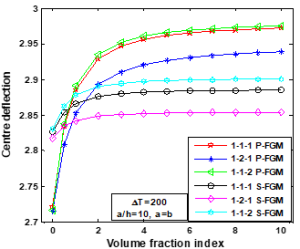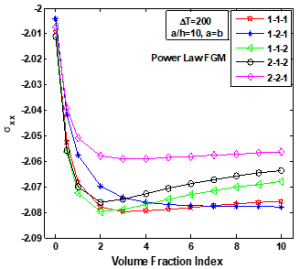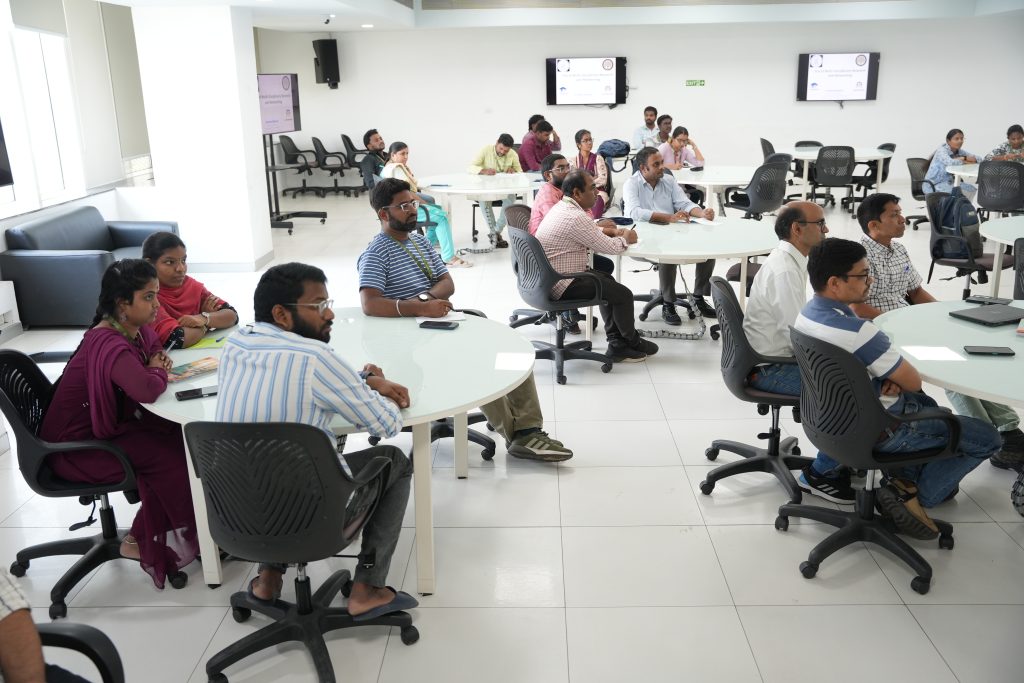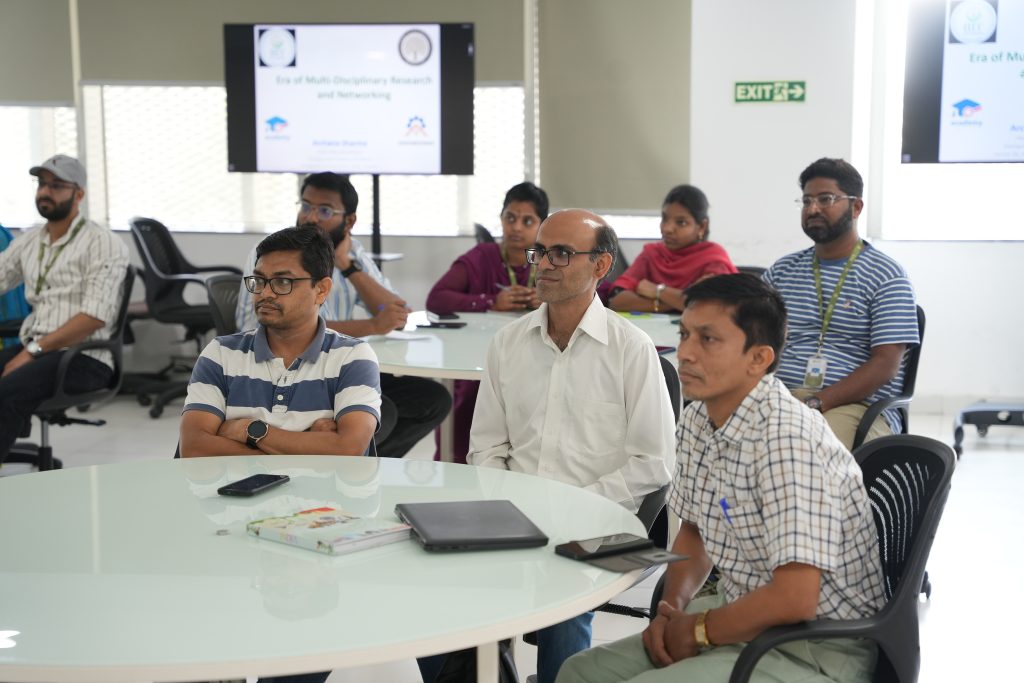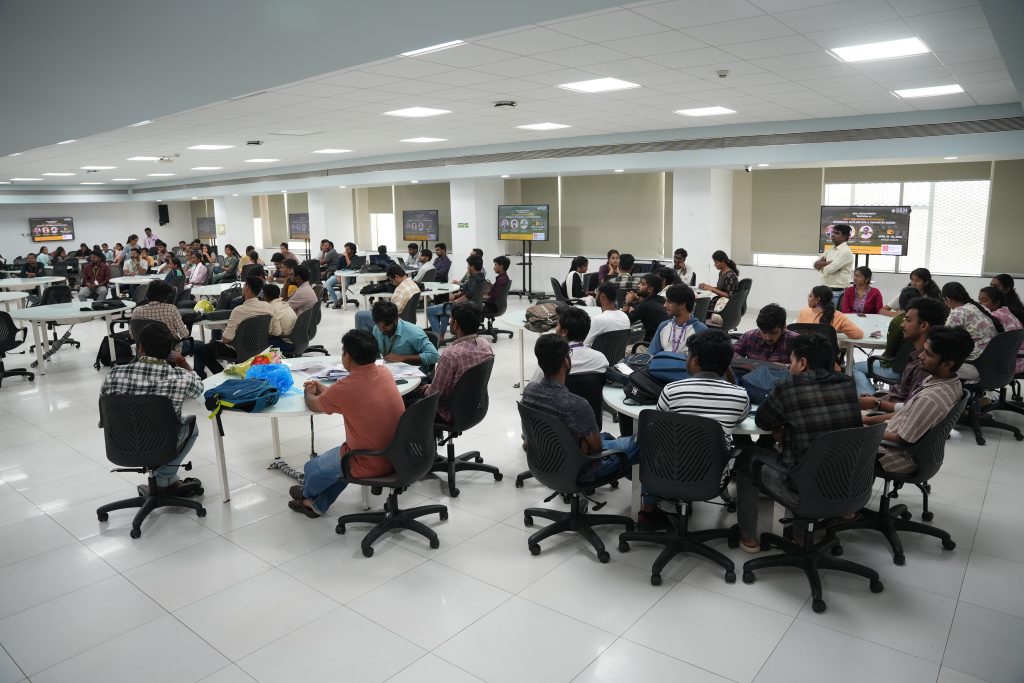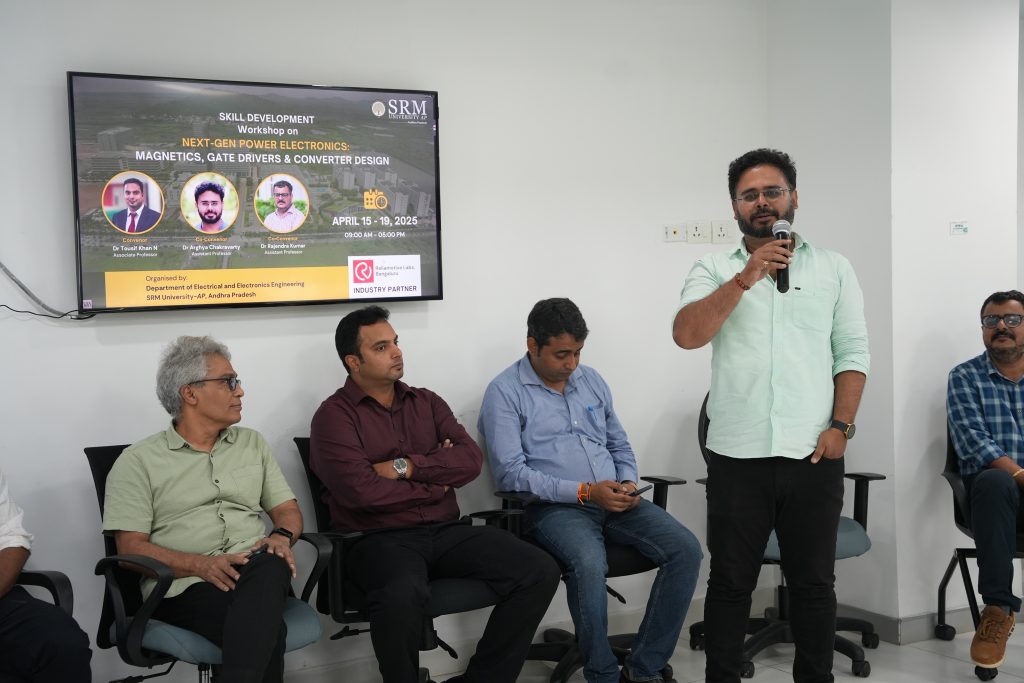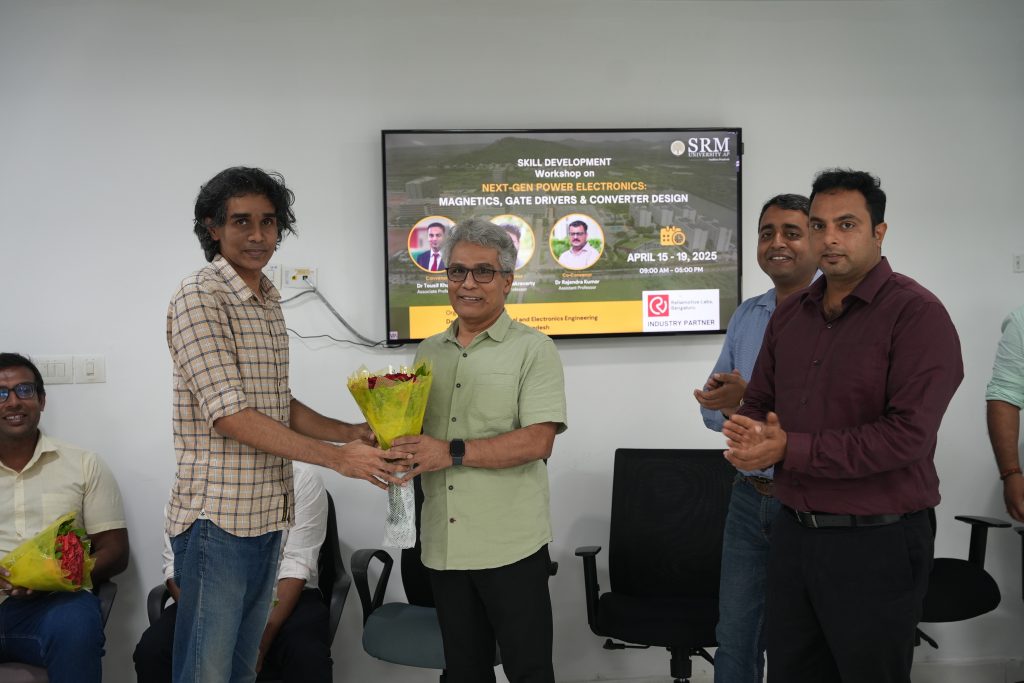SRM-AP All News
ALL News
- Analysing Thermo-mechanical Bending Behaviour of Sigmoid FGM Sandwich Plate May 21, 2025
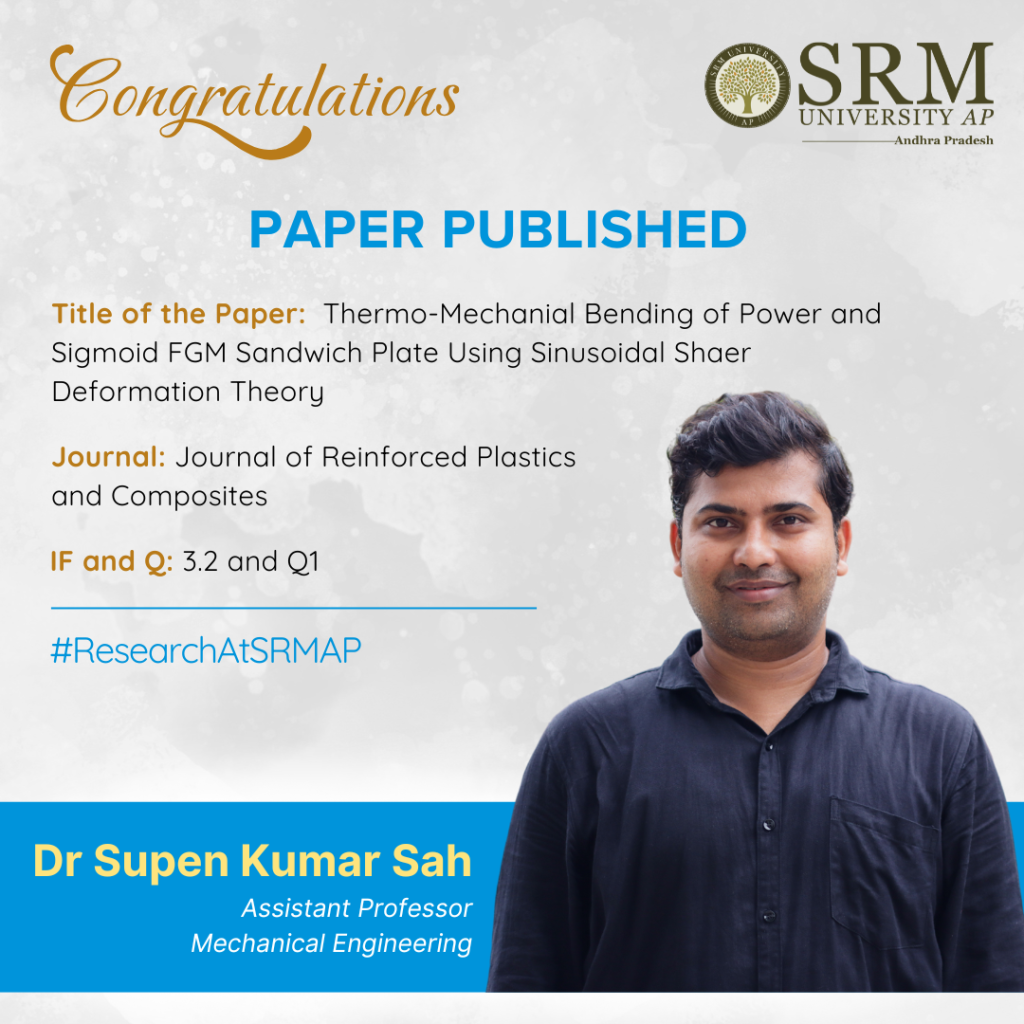
Dr Supen Kumar Sah, Assistant Professor at the Department of Mechanical Engineering presents his exclusive study on the thermo-mechanical bending behaviour of functionally graded material (FGM) sandwich plates using the Sinusoidal Shear Deformation Theory (SSDT) in his recent paper titled “Thermo-mechanical bending of power and sigmoid FGM sandwich plate using sinusoidal shear deformation theory”. The paper has been published in the Journal of Reinforced Plastics and Composites, having an impact factor of 3.2.
Abstract
This study examines the thermo-mechanical bending behaviour of functionally graded material (FGM) sandwich plates with temperature-dependent properties. FGMs, typically made from metal and ceramic, combine rigidity and high thermal resistance, and their properties are assumed to vary continuously in thickness. Using sigmoid and power law distributions, we analyse the smooth variation of properties and apply a one-dimensional heat conduction equation to determine temperature changes. The Sinusoidal Shear Deformation Theory (SSDT) is utilised to account for the sinusoidal distribution of shear stress while meeting traction-free boundary conditions. We derive the governing equations through Hamilton’s variational principle and Navier’s solution, resulting in closed-form solutions for center deflection, and normal and shear stresses of the plates. The analysis reveals that temperature-dependent properties and gradation indices significantly affect central deflection, normal stress, and shear stress. The SSDT results align well with existing shear deformation theory, confirming its accuracy.
Dr Sah collaborated with Dr Anup Ghosh from IIT Kharagpur on the research study. He aims to continue his research on FGMA and focus on the structural analysis of multidirectional Functionally Graded Material sandwich plates in the future.
Continue reading → - Critical agendas for the areal linguistics: locating Sindhi within South Asia May 20, 2025
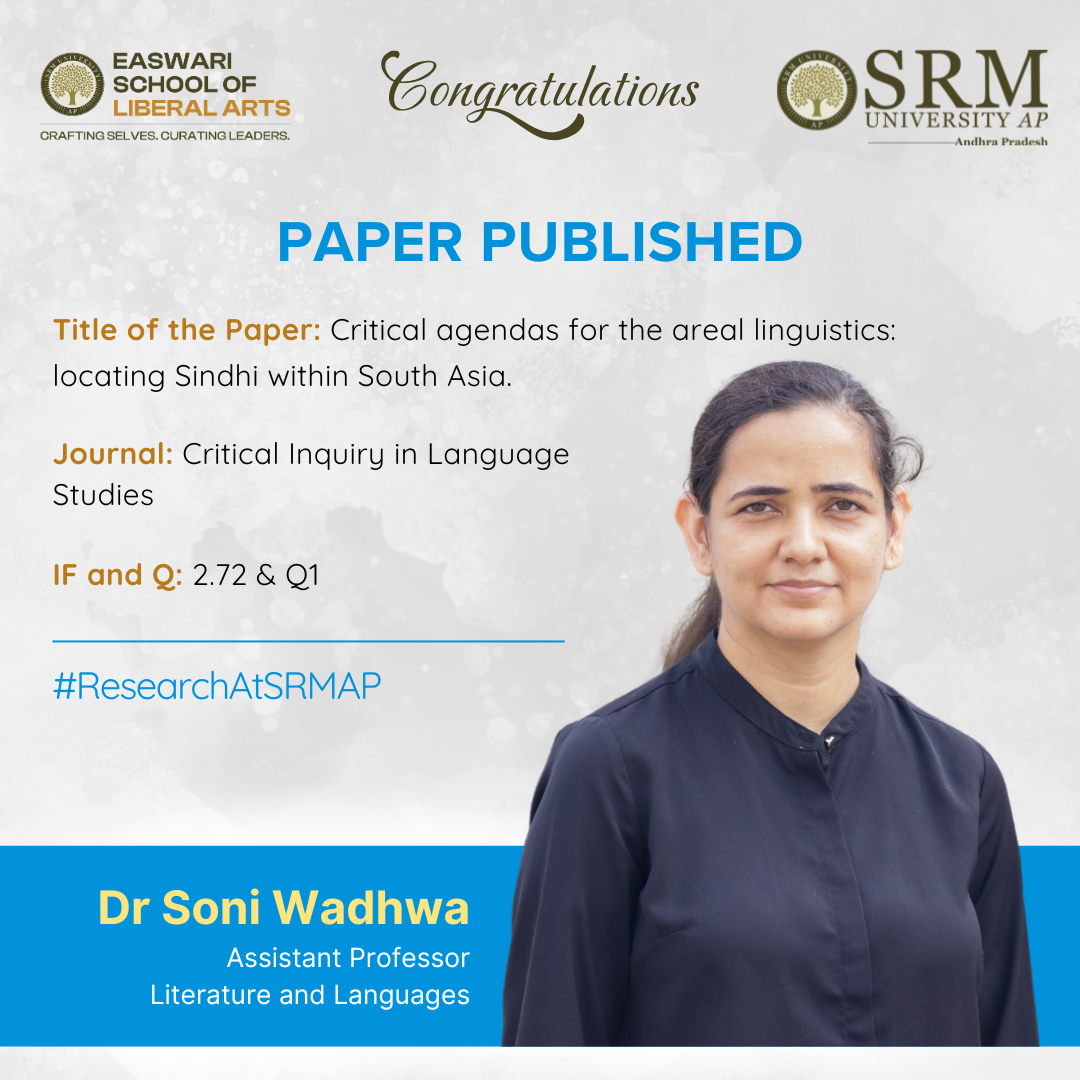 The Sindhi language presents a compelling case for examining the intersections of language, territory, and identity in the post-Partition context. In India, Sindhi often survives as a spoken language, primarily confined to the domestic sphere. This restricted use raises important questions about the conditions necessary for linguistic vitality.
The Sindhi language presents a compelling case for examining the intersections of language, territory, and identity in the post-Partition context. In India, Sindhi often survives as a spoken language, primarily confined to the domestic sphere. This restricted use raises important questions about the conditions necessary for linguistic vitality.Exploring the complexities surrounding Sindhi Dr Soni Wadhwa, Assistant Professor in the Department of Literature and Languages, has published a research article titled “Critical agendas for the areal linguistics: locating Sindhi within South Asia” in the Q1 journal Journal of Critical Inquiry in Language Studies. This publication contributes significantly to scholarly discussions on areal linguistics, offering critical insights into the precarious position of Sindhi and the broader implications for language studies in postcolonial South Asia.
This article explores these dynamics to foreground the often-overlooked role of technological, epistemological, and aesthetic resources in sustaining minority languages. In doing so, it positions Sindhi as a critical lens through which to understand the challenges faced by minoritised languages in the Global South, particularly those without a clear territorial anchoring.
Abstract
As a concept within applied linguistics, areal linguistics concerns itself with investigating the nature of structural similarities among languages produced by contact rather than by history or by genetic similarities. A critical look at its descriptive linguistic agendas reveals that the domain needs to be revisited in terms of questions of power relations and linguistic inequalities within specific linguistic
areas. Such investigations reconfigure the dynamics of geography and regionality within language as a site of power.This study seeks to make an intervention into India as a linguistic area with a focus on Sindhi, a non-regional language in India. Given that the language and the community do not have a state or a linguistic territory within India, the condition of Sindhi is characterised by a sense of precarity. Seen through the prism of India as a linguistic area, this precarity is not quite visible. In revisiting the celebrated concept of India as a linguistic area, this study suggests ways of asking contemporary questions about areal linguistics that go beyond describing the nature of contact among languages, and instead ask how this contact impacts the markers of hegemony over minor languages in terms of technological,epistemological, and aesthetic leverage.
Social Implications of the Research
This research might help in building further study around minority languages in India as well as elsewhere in the Global South, we empower more languages. This will help people who know regional languages access the Internet and other aspects that Digital India aspires to address.
Sindhis in India are scattered in different cities and speak the regional or state languages or English at home. This work helps in pushing more research on the language and the community which can further inform policies for linguistic empowerment.
Continue reading → - Advancing Next-Gen PEM Fuel Cells: Role of Nanostructured Catalysts May 20, 2025
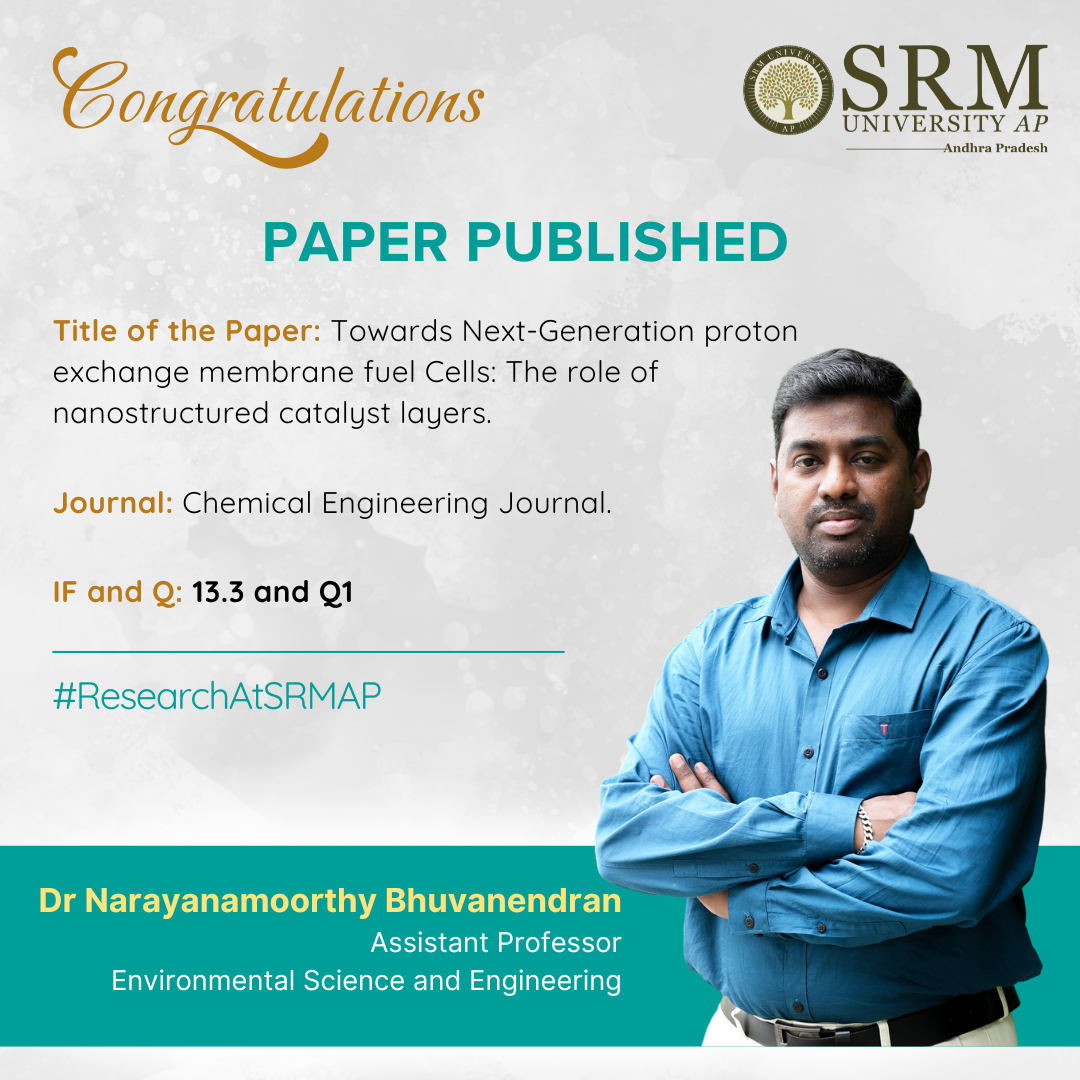 The transition to sustainable energy sources has become imperative due to the exhaustion of conventional resources caused by excessive use and their detrimental impact on the environment. Currently, alternative energy sources, such as solar, wind, nuclear, tidal, and geothermal energy, hydro have been introduced. Over the last few decades, focus has shifted to the use of hydrogen energy as a promising alternative to traditional power sources in almost all sectors requiring energy applications.
The transition to sustainable energy sources has become imperative due to the exhaustion of conventional resources caused by excessive use and their detrimental impact on the environment. Currently, alternative energy sources, such as solar, wind, nuclear, tidal, and geothermal energy, hydro have been introduced. Over the last few decades, focus has shifted to the use of hydrogen energy as a promising alternative to traditional power sources in almost all sectors requiring energy applications.However, a major challenge holding back their widespread use is the high cost and limited performance of a key component called the catalyst layer (CL). This layer is responsible for speeding up the chemical reaction that generates electricity, but it typically requires a large amount of platinum, a rare and expensive metal and often has a thick, disordered structure that reduces efficiency.
This research, titled “Towards Next-Generation proton exchange membrane fuel Cells: The role of nanostructured catalyst layers” led by Dr. Narayanamoorthy Bhuvanendran, Assistant Professor, Department of Environmental Science and Engineering, was published in the Q1 Journal, Chemical Engineering Journal, with an Impact Factor of 13.4. The paper focuses on designing advanced nanostructured catalyst layers that are thinner, more organised, and use much less platinum. These next-generation CLs can help fuel cells perform better, last longer, and become more affordable.
The study reviews recent progress in this field, highlights innovative methods for creating these new structures, and outlines future directions to improve their practicality and environmental impact. Ultimately, this work aims to bring us closer to clean, efficient, and widely accessible fuel cell technology.
Fuel cells offer clean energy with zero emissions when using hydrogen, and higher energy efficiency than diesel or gas engines. Among them, Proton Exchange Membrane Fuel Cells (PEMFCs) are one of the most promising technologies. PEMFCs produce only water as a byproduct, making them a clean energy alternative to fossil fuels.
Abstract:
Catalyst layer (CL) is the major component of proton exchange membrane fuel cells (PEMFCs) and routinely fabricated by a catalyst ink-based processing method. Such conventional CLs typically confront low activity, unaffordable Pt loading, and severe mass transport issues due to the thick and disordered structure, hampering the widespread commercial application of PEMFCs.Engineering of nanostructured CLs with low/ultralow Pt loading, ordered and/or ultrathin CLs, provides a highly promising pathway for overcoming these limitations. For the practical application of the nanostructured CLs in PEMFCs, this review comprehensively summarises and comments on the important research and development of nanostructured CLs over recent years, involving ordered electronic conductor-based CLs, ordered ionomer-based CLs, and ultrathin CLs.
The reviewed processes include
(i) analysing the motivation and necessity to design and fabricate nanostructured CLs based on the structure and mass transport process of conventional CLs,
(ii) scrutinising structure and composition, preparation methods, advantages, as well as
some feasible strategies for the remaining challenges of various nanostructured CLs in
detail,
(iii) the progress of single cell activity and durability of the nanostructured CLs. Finally, some perspectives on remaining challenges and future development of the nanostructured CLs are presented to guide the exploitation for the next-generation of advanced CLs of PEMFCs.Practical implementations:
The practical objective of this study is to facilitate the development of more efficient, cost-effective, and durable proton exchange membrane fuel cells (PEMFCs) through the redesign of the catalyst layer utilising advanced nanostructures. This enhancement has the potential to substantially decrease dependence on costly platinum, reduce production expenses, and enhance the overall performance of fuel cells.
In terms of societal impact, this research contributes to the transition towards clean and sustainable energy systems, thereby reducing greenhouse gas emissions and air pollution associated with conventional fossil fuels. By making fuel cell technology more accessible and scalable, particularly for transportation and portable power applications, it supports global initiatives to combat climate change and improve energy security for future generations.
Collaborations:
Continue reading →
Prof. Huaneng Su, Institute for Energy Research, Jiangsu University, Zhenjiang, China. - A Full-bridge Multiple-load LED Driver Offering Clean Energy May 16, 2025
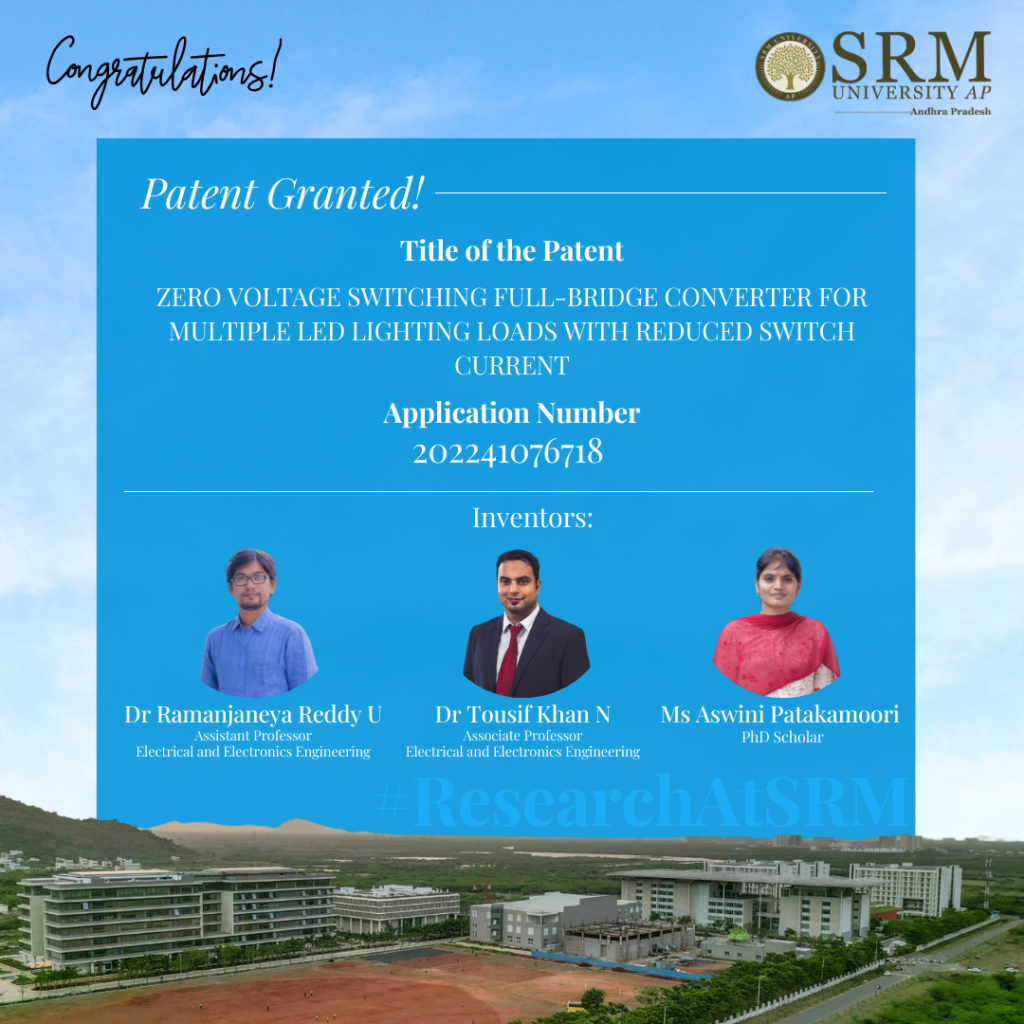
The Department of Electrical and Electronics Engineering proudly announces that the invention “Zero Voltage Switching Full-bridge Converter for Multiple LED Lighting Loads with Reduced Switch Current” with Application number: 202241076718 has been granted to Dr Ramanjaneya Reddy, Assistant Professor, Dr Tousif Khan Nizami, Associate Professor, and Ms Aswini Patakamoori, PhD Scholar in the Indian Patent Office Journal.
The research focuses on creating an energy-efficient power supply for LED lights, especially in areas that use a DC electricity system. The team has designed a system that can power multiple LED lights from a single unit, saving energy and cost. This system works at a very high efficiency of about 97.5%, which means very little energy is wasted as heat.
The special design uses a method called “soft switching,” which helps the internal parts of the system turn on and off with less stress, reducing heat and improving lifespan. It also needs fewer parts for each light, making it simpler, more reliable, and cheaper to produce. Additionally, the system allows the lights to be dimmed easily using a basic on-off control method, giving flexibility in brightness as needed.
Abstract
A 110 W soft-switched full-bridge multiple load LED driver is designed for DC-grid applications, achieving a high efficiency of 97.52%. The full-bridge configuration ensures that the switches carry minimal current, reducing conduction losses, and offers zero-voltage switching, significantly lowering switching losses. The reduced component count per lamp simplifies the design, enhances reliability, and reduces overall system costs. Additionally, the driver supports PWM-based dimming through simple on-off control, offering flexibility in illumination levels.
Practical Implementation/ Social Implications of the Research
The developed 110 W soft-switched full-bridge multiple-load LED driver is a highly efficient and scalable solution tailored for DC-grid applications, particularly those integrated with solar and battery-based energy systems. Operating at an impressive efficiency of 97.52% ensures minimal energy loss. This technology promotes sustainable development by enabling cleaner energy usage and reducing carbon emissions. Its simple, cost-effective design makes advanced lighting more accessible, especially in low-income or remote communities. Additionally, the ability to dim lights easily helps conserve energy further and allows users to adapt lighting to different needs, enhancing comfort and minimising waste.
Future Research Plans
To design more efficient, adaptable, and sustainable LED driver circuits,
- Extending soft-switching techniques to automotive, industrial, and smart lighting systems for broader applications.
- Incorporating digital control strategies for intelligent dimming, adaptive power regulation, and real-time performance monitoring.
- Exploring advanced semiconductor materials, such as Gallium Nitride (GaN) and Silicon Carbide (SiC), to enhance switching performance and thermal stability. Integration of energy harvesting techniques to create self-sustaining LED driver systems powered by renewable sources such as solar energy.
- A New Phase of Engineering Education: Insights from Prof. Archana Sharma May 15, 2025
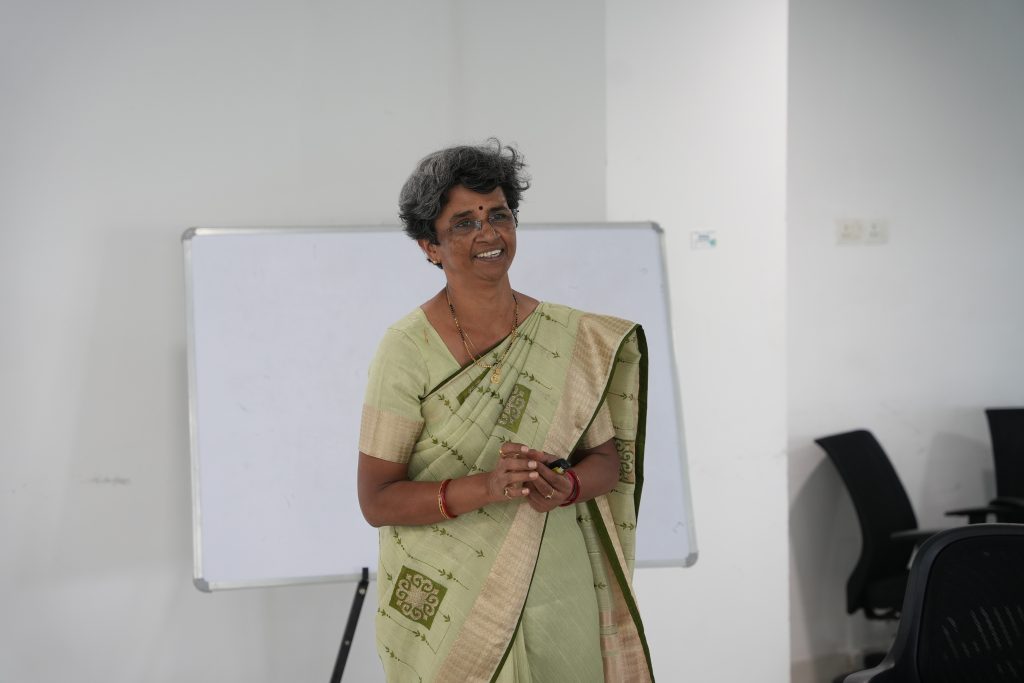
The Department of Electrical and Electronics Engineering invited Prof. Archana Sharma, Distinguished Professor at Dr Shyama Prasad Mukherjee International Institute of Information Technology, Naya Raipur, and Senior Professor at HBNI Mumbai, for a Distinguished Lecture on May 01, 2025. Prof. Archana Sharma delivered an insightful session on “Era of Multi-Disciplinary Research and Networking in Engineering Education” emphasising the significance of multidisciplinary research and networking in engineering education, commending institutes driving innovation for a progressive, Viksit Bharat.
Prof. Sharma, a globally acclaimed expert in beam technology and nuclear applications, elucidated that as India aspires to become a developed nation by 2047 during its ‘Amrit Kaal’, synergy among academia, industry, and researchers is vital. She also shed light on her pioneering contributions—from developing India’s first multi-gigawatt pulsed power system to driving sustainable technologies in wastewater treatment.
The talk sparked vibrant discussions around emerging research opportunities, with special focus on the possible installation of an electron beam accelerator at SRM AP for material and agricultural applications. The session provided invaluable insights to students and researchers on navigating the evolving landscape of science and technology with a multi-disciplinary lens.
Continue reading → - Special Lecture on Future of Migration in India May 15, 2025
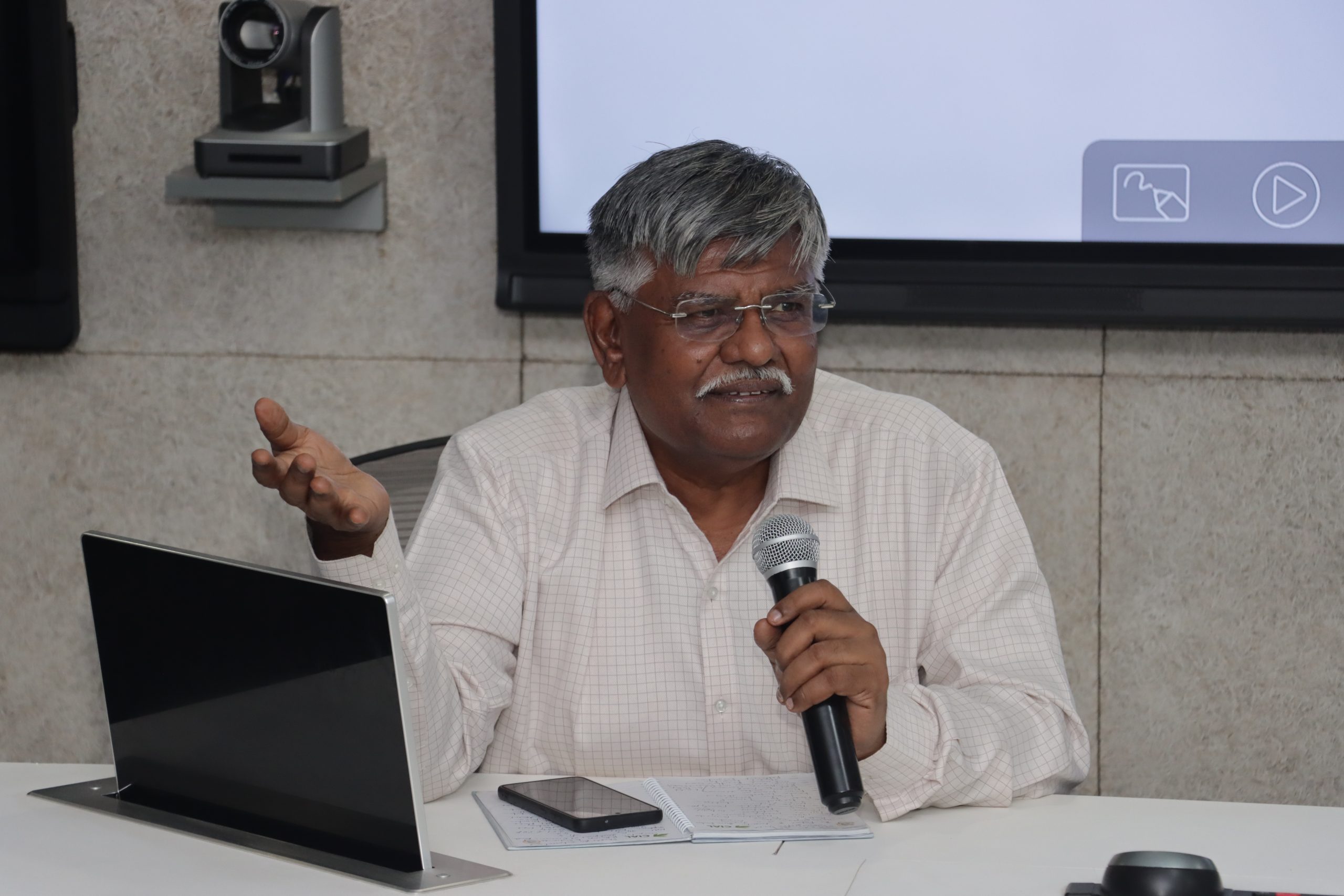
The Department of Economics, Easwari School of Liberal Arts, organised a lecture on the topic “Future of Migration in India”. Prof. S Irudaya Rajan, Distinguished Visiting Faculty at the Department and Chairman of the International Institute of Migration and Development (IIMAD), Kerala, delivered an engaging talk for the special lecture.
Prof. Rajan, a leading demographer and renowned expert in migration studies, provided an in-depth analysis of India’s internal and international migration trends. He discussed the implications of demographic changes, urbanisation, labour market dynamics, and policy challenges. Drawing from empirical data and his extensive research, he stressed the urgent need for a comprehensive migration policy in India, particularly in light of reverse migration during COVID-19 and the growing issue of climate-induced displacement. He also touched upon the demographic consequences of migration, including its impact on fertility and mortality rates.
The talk attracted participants from diverse academic backgrounds, including faculty members, undergraduate students, and research scholars. The lecture concluded with a lively Q&A session, reflecting a strong interest in migration and development issues among attendees.
The event was a resounding success, contributing meaningfully to academic dialogue at SRM University-AP. It reinforced the institution’s commitment to interdisciplinary research and public policy engagement, while offering valuable insights into one of India’s most pressing socio-economic challenges.
Continue reading → - Lecture on Large Values of Fourier Coefficients May 15, 2025
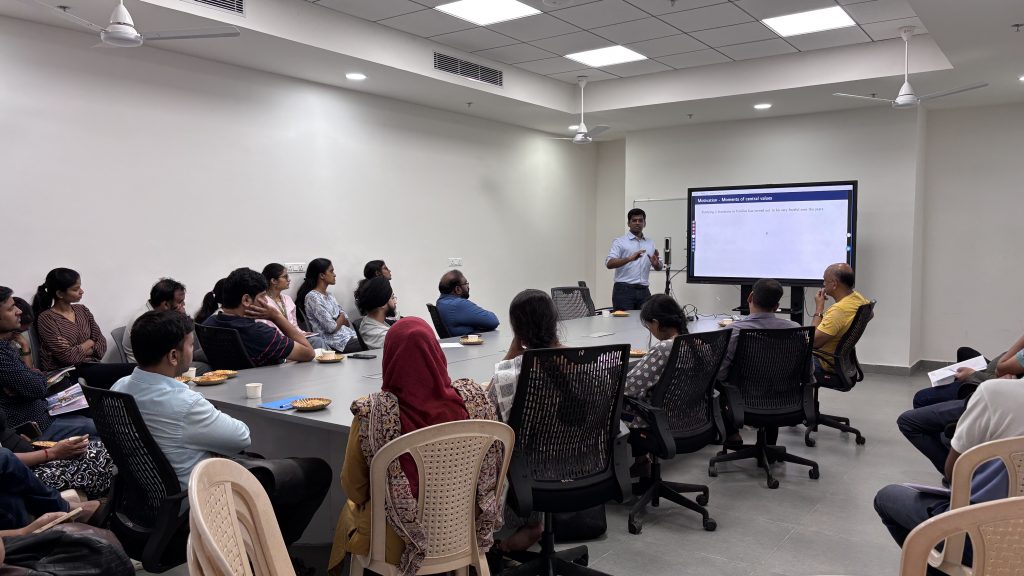
The Department of Mathematics organised a guest lecture on May 07, 2025. Dr Krishnarjun Krishnamoorthy, a post-doctoral fellow at the Beijing Institute of Mathematical Sciences and Applications delivered an insightful talk on “Large Values of Fourier Coefficients”. He discussed a modification of Soundararajan’s resonance method to produce large values of Fourier coefficients of half-integral weight Hilbert modular forms.
Around 30 participants, including faculty members and research scholars, attended the lecture. Following the talk, a vibrant question-and-answer session allowed attendees to engage deeply with the topic, showcasing their enthusiasm and curiosity.
The event was a great success, fostering academic interest and collaboration within the university. It provided a valuable opportunity for the academic community to interact with an active researcher in the field and gain deeper insights into advanced mathematical topics.
Continue reading → - Skill Development Workshop on Next Gen Power Electronics May 15, 2025
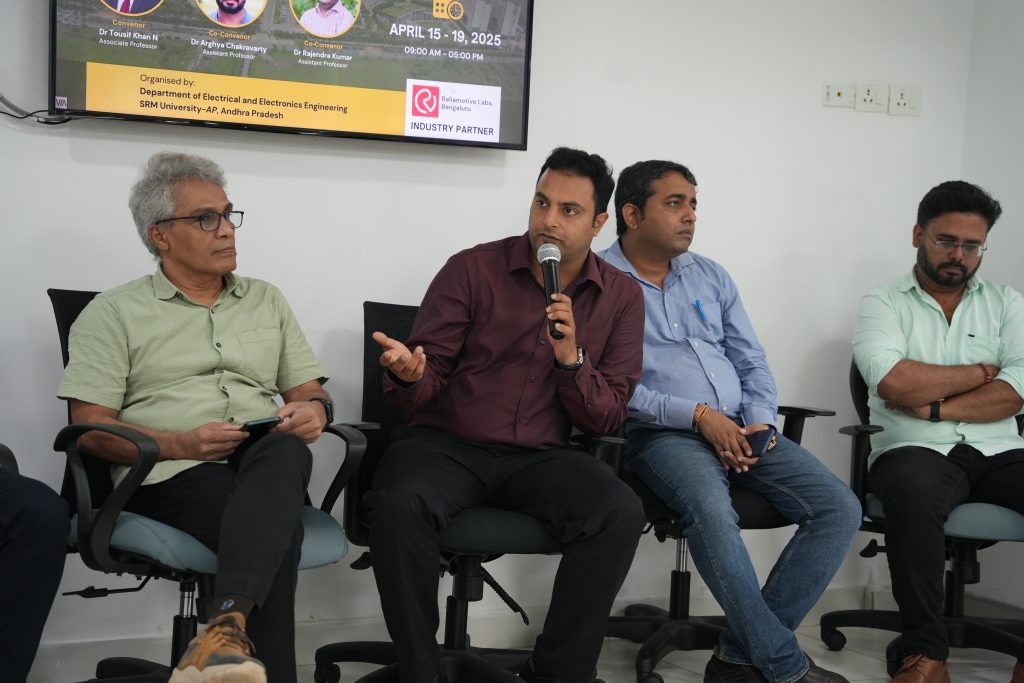
The Department of Electrical and Electronics Engineering organised a Skill Development Workshop on Next-Gen Power Electronics: Magnetics, Gate Drivers & Converter Design. Mr Sadeep Sasidharan, Director, Reliamotive Labs, Dr Ashiq Muhammed, Assistant Professor, NIT Calicut and Mr Aravind Gopalakrishnan, Co-founder, Reliamotive Labs, were the resource persons for the workshop along with faculty members of SRM University-AP.
The workshop provided participants with a comprehensive understanding of the rapidly evolving field of power electronics, combining theoretical knowledge with practical insights. Participants enhanced their expertise through offline sessions delivered by in-house faculty and industry experts from Reliamotive Labs, Bangalore.
The workshop covered the latest trends and technologies in power electronics, with a particular focus on hardware design and development of converters, the design of magnetics for the Flyback Converter, and designing PCBs using KiCad software. It offered hands-on learning opportunities and provided exposure to real-world applications. Participants had the chance to network with professionals, researchers, and experts, fostering collaboration and the exchange of innovative ideas. The workshop has resulted in the participants developing technical skills in circuit design, analysis, and troubleshooting, as well as gaining proficiency with industry tools and software.
An insightful Q&A session helped participants clarify concepts and deepen their understanding during interactions with industry experts. Post-workshop, attendees applied the knowledge gained through mini-projects or continued practice, especially in hardware design and magnetics. Networking with peers and staying connected with resource persons opened doors for collaborative opportunities and further learning.
Continue reading → - Revolutionising Food Safety: SRM AP Joins Hands with CraftZymes May 15, 2025
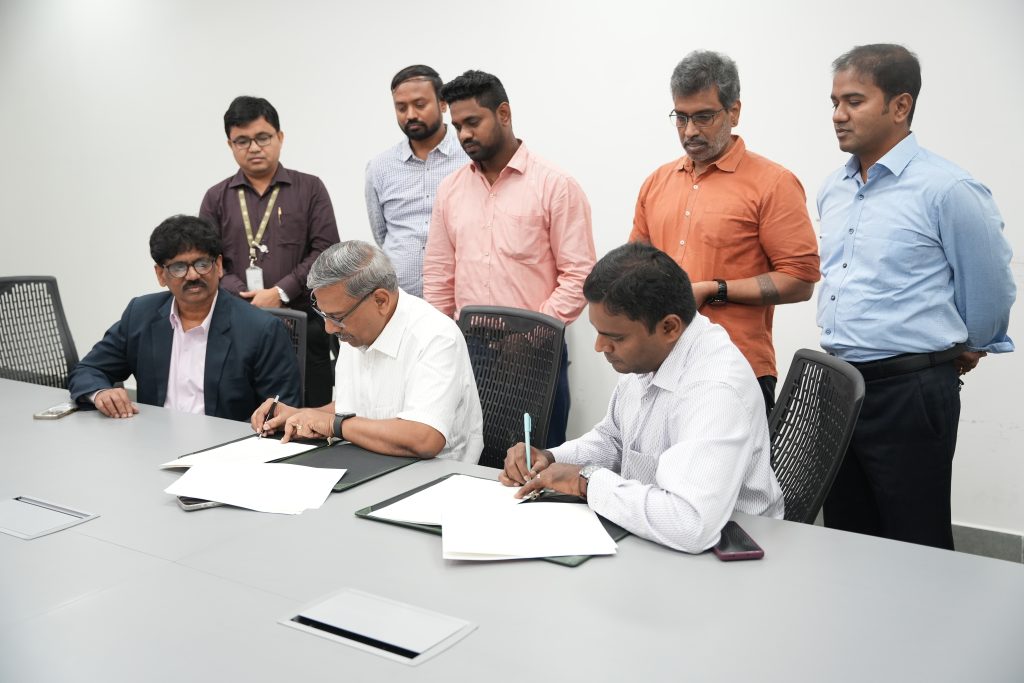
In a remarkable effort towards enhancing food safety and organic food authentication, SRM University-AP, Amaravati has entered into a collaborative research and development programme with CraftZymes Company Pvt. Ltd. The joint initiative, titled the “CraftZymes–SRM AP” Research Programme, focuses on the discovery and development of advanced technologies in the field of spectroscopy, specifically Surface Enhanced Raman Spectroscopy (SERS), for the detection of pesticide residues on food and raw materials. Formalising this partnership an MoU was signed in the presence of representatives from both parties.
As part of this collaboration, both entities have successfully developed a novel technology titled “Identification of Pesticide and Chemical Residues on Food Sources Using Surface Enhanced Raman Spectroscopy”. Recognising the potential impact of this innovation, SRM University-AP, and CraftZymes have agreed to file a joint patent application, marking a major milestone in their shared commitment to sustainable and safe food technologies.
The research aims to address critical challenges in detecting trace pesticide residues with high sensitivity, contributing to the authentication of food products labelled as organic.
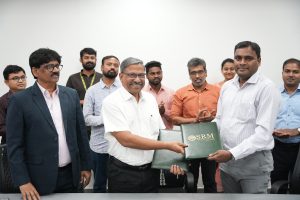
SRM-AP will serve as the host institution for all research activities, providing the necessary academic and infrastructural support to ensure the successful execution of the project. While CraftZymes, take the lead in customising the technology for real-world deployment. This includes conducting market and field studies to transform the core technology into user-friendly, field-deployable devices tailored to specific stakeholder needs. The startup will also spearhead commercialisation efforts to bring the technology to the marketplace.
This partnership highlights the shared commitment of both institutions to harnessing innovative scientific tools, such as SERS, to advance public health, support organic agriculture, and verify food authenticity. The jointly developed technology demonstrates their dedication to applying cutting-edge research to real-world challenges with meaningful impact.
Continue reading → - MSc Mathematics Student Secures Mitacs Globalink Research Award May 14, 2025
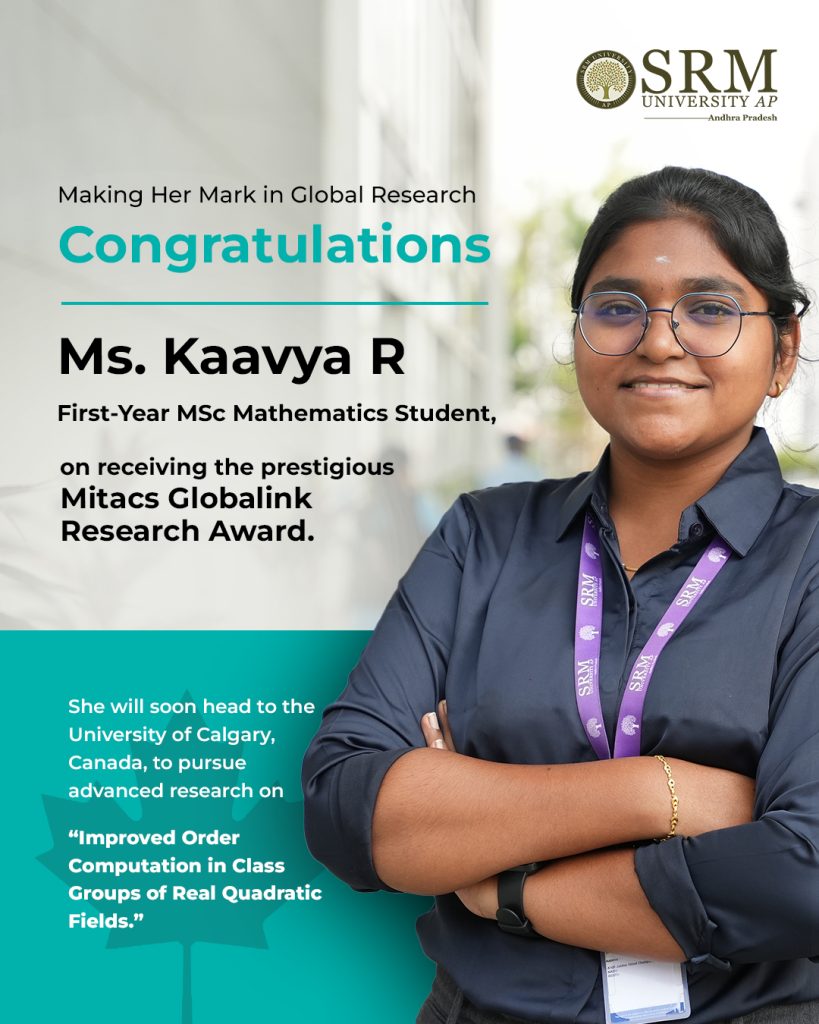
Ms Kaavya R, first-year MSc Mathematics student, has been awarded the prestigious Mitacs Globalink Research Award, a global award for international students. Under this honour, she will pursue a 12–24 week research project titled “Improved Order Computation in Class Groups of Real Quadratic Fields” at the University of Calgary, Canada, under the supervision of Prof. Michael John Jacobson. Prof. Kalyan Chakraborty, her mentor at SRM University-AP, continues to play a pivotal role in her academic journey.
This award offers a grant of $6,000 CAD (approx. ₹3,67,000) and marks Kaavya’s second major research opportunity, following her selection for the IASc-INSA-NASI Summer Research Fellowship, under which she will work at the Indian Statistical Institute, Bengaluru, with a monthly stipend of ₹12,500.
Kaavya credits her professors and department faculty for their constant support, especially Prof. Chakraborty, whose mentorship has helped shape her interests in number theory and research.
Kudos to Ms Kaavya for her remarkable achievement and continued success in exploring new mathematical horizons
Continue reading →


